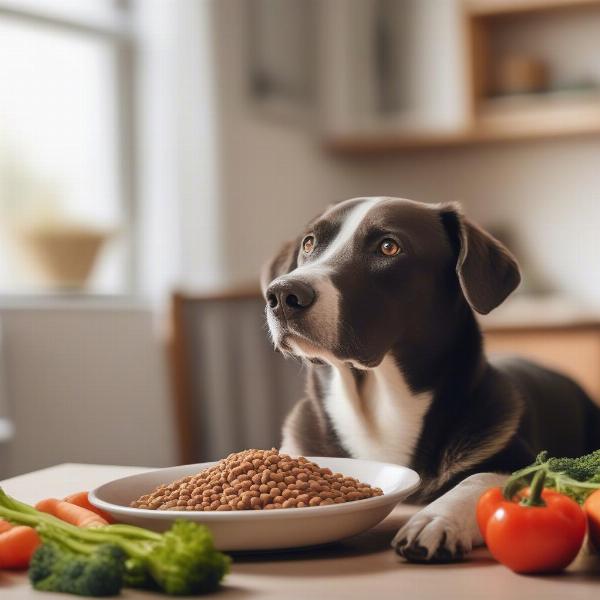Cancer is a devastating diagnosis for any pet owner. While we can’t completely eliminate the risk, understanding the factors that contribute to canine cancer and taking proactive steps can significantly reduce the likelihood of our furry friends developing this disease. This guide will delve into the various ways you can help prevent cancer in dogs, covering everything from diet and lifestyle to regular veterinary checkups.
Understanding Canine Cancer Risk Factors
Just like in humans, canine cancer can be influenced by a combination of genetics, environmental factors, and lifestyle choices. Certain breeds are predisposed to specific types of cancer. For example, Golden Retrievers and Boxers have a higher risk of lymphoma, while German Shepherds are prone to hemangiosarcoma. Environmental factors such as exposure to secondhand smoke, certain pesticides, and herbicides can also increase the risk. Understanding these risks is the first step towards prevention.
 A dog eating healthy food
A dog eating healthy food
The Power of Diet in Cancer Prevention
Nutrition plays a crucial role in maintaining a dog’s overall health and can significantly impact their susceptibility to cancer. Feeding your dog a balanced diet rich in antioxidants, vitamins, and minerals can bolster their immune system and protect against cellular damage that can lead to cancer. Avoid processed foods, excessive fats, and artificial additives, opting instead for high-quality dog food formulated with natural ingredients.
Choosing the Right Food
Look for dog food that lists whole meats and vegetables as the primary ingredients. Avoid foods with fillers, artificial colors, and preservatives. Consider adding supplements like omega-3 fatty acids, which have anti-inflammatory properties and may help reduce cancer risk. Consulting with your veterinarian about the best diet for your dog’s specific breed and age is always recommended.
Minimizing Environmental Risks
Protecting your dog from environmental carcinogens is as crucial as a healthy diet. Avoid using chemical pesticides and herbicides in your yard, opt for natural alternatives whenever possible. Don’t expose your dog to secondhand smoke, as it has been linked to several types of cancer in dogs. Limit their exposure to excessive sunlight, particularly during peak hours, to reduce the risk of skin cancer.
Regular Veterinary Checkups: Early Detection is Key
Regular veterinary checkups are paramount in preventing cancer. Early detection significantly increases the chances of successful treatment. Your veterinarian can perform routine screenings and detect any abnormalities early on, when treatment is most effective. Discuss any concerns you have about your dog’s health with your veterinarian, no matter how small they may seem.
What to Expect During a Checkup
Your veterinarian will conduct a thorough physical examination, checking for lumps, bumps, and any other signs of potential cancer. They may also recommend blood tests and other diagnostic procedures based on your dog’s breed, age, and overall health.
Spaying/Neutering and Cancer Prevention
Spaying or neutering your dog can significantly reduce their risk of certain reproductive cancers. Spaying eliminates the risk of ovarian and uterine cancer, and greatly reduces the risk of mammary cancer. Neutering eliminates the risk of testicular cancer and reduces the risk of prostate cancer.
Maintaining a Healthy Weight and Exercise Routine
Obesity is a significant risk factor for several types of cancer in dogs. Maintaining a healthy weight through a balanced diet and regular exercise can significantly reduce this risk. Exercise also boosts the immune system and improves overall health, further contributing to cancer prevention.
Cancer Prevention: A Lifelong Commitment
Preventing cancer in dogs is an ongoing process that requires a proactive approach. By focusing on a healthy diet, minimizing environmental risks, and scheduling regular veterinary checkups, you can significantly reduce your dog’s chances of developing this devastating disease.
FAQ
- What are the early signs of cancer in dogs? Unexplained lumps, sores that don’t heal, sudden weight loss, changes in appetite, difficulty breathing, and persistent coughing or vomiting are some potential signs.
- Can vaccinations cause cancer in dogs? While there have been some anecdotal reports linking vaccinations to injection-site sarcomas, these are extremely rare. The benefits of vaccinations far outweigh the potential risks.
- Are certain dog breeds more prone to cancer? Yes, certain breeds like Golden Retrievers, Boxers, German Shepherds, and Rottweilers have a higher predisposition to specific types of cancer.
- Is there a cancer screening test for dogs? While there isn’t a single test to screen for all types of cancer, your veterinarian can recommend specific tests based on your dog’s breed, age, and health history.
- What can I do to minimize my dog’s exposure to environmental carcinogens? Avoid using chemical pesticides and herbicides in your yard, don’t expose your dog to secondhand smoke, and limit their exposure to excessive sunlight.
- How often should I take my dog for a checkup? Annual checkups are recommended for most adult dogs, while senior dogs may benefit from more frequent visits.
- What is the best diet for cancer prevention in dogs? A balanced diet rich in antioxidants, vitamins, minerals, and high-quality protein is crucial. Consult with your veterinarian for personalized recommendations.
ILM Dog: Your Partner in Canine Care
ILM Dog is a leading online resource dedicated to providing dog owners with reliable and practical information on all aspects of dog care. We cover everything from breed selection and health to training, nutrition, grooming, and travel. Whether you’re a seasoned dog owner or just starting your journey, ILM Dog is here to support you every step of the way. For expert advice and personalized guidance, contact us at [email protected] or call +44 20-3965-8624. Visit us at ILM Dog for more valuable resources on dog health and well-being.